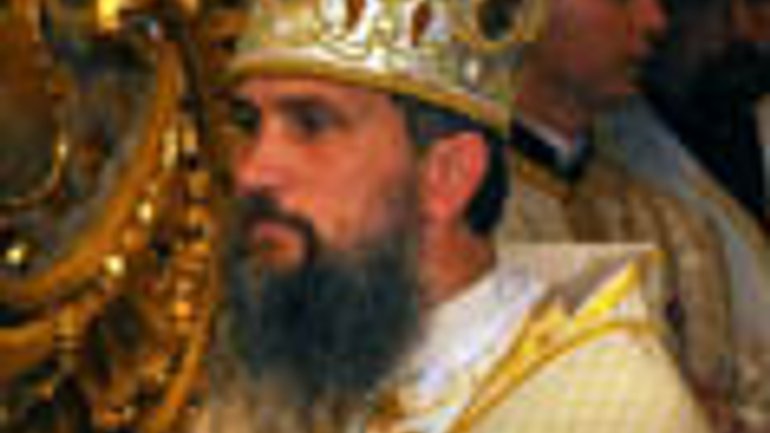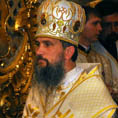Bishop Benedict Aleksiychuk: “For me, Patriarch Lubomyr is an example of someone who, despite his human limitations, allows God to act in himself”

 During the 10 years of his ministry as patriarch of the UGCC, His Beatitude Lubomyr was for all Ukrainian Greek Catholics, and for others as well, a moral authority and example of how one must live in Christ. In an interview with Bishop Benedict Aleksiychuk, auxiliary bishop of the Lviv Archeparchy of the UGCC, we learn more about the basis for his pastoral charisma and about his influence on the spiritual life of Ukrainians.
During the 10 years of his ministry as patriarch of the UGCC, His Beatitude Lubomyr was for all Ukrainian Greek Catholics, and for others as well, a moral authority and example of how one must live in Christ. In an interview with Bishop Benedict Aleksiychuk, auxiliary bishop of the Lviv Archeparchy of the UGCC, we learn more about the basis for his pastoral charisma and about his influence on the spiritual life of Ukrainians.
– His Beatitude Lubomyr is a Studite monk and was once the archimandrite of the Studites. Bishop, how do you think the patriarch’s experience in the Studite community has influenced him?
– I wouldn’t say that his stay in the Studite community has only influenced him, but rather upon becoming patriarch he remained a monk. When a monk lives a profound Christian life, he easily allows God to act in himself in whatever position he may occupy in the church. For His Beatitude, his monasticism is the solid foundation upon which manifests his episcopal, and later, patriarchal ministry. And this, I believe, fundamentally significant for him.
– His Beatitude Lubomyr once said that the patriarch’s administration is a large and rather heavy cross and that he considers monastic prayer the basis of his vocation. What role do you think Patriarch Lubomyr’s monastic spiritual experience plays in the life and development of our church?
– First off, I want to say that the Lord calls each of us as Christians to go and be His witnesses. In the normal, secular understanding, a witness can be someone who sees an occurrence, because if a person didn’t see it but witnesses it, he is deceiving. It is only possible to be a witness for Christ when you yourself have experienced God. I think when he said “he considers monastic prayer the basis of his vocation,” His Beatitude wanted to draw attention to the fact that when you are a monk you have only your personal, sometimes unknown, life, your “struggle,” your troubles. And in the case of His Beatitude, when he began his patriarchal service he no longer had only his personal life with God, his personal spiritual “struggle,” but a spiritual “struggle” in the context of the entire church and the entire community. He had to be a witness for Christ for all whom he met on his life’s path. When one seeks God, he understands that his experience of God is less than how he wants it and that is why no monastic wants to take on the responsibility of being a witness. That is why I completely understand the patriarch’s position.
– According to various polls, Patriarch Lubomyr is an absolute moral authority for Ukrainians—not only for Greek Catholics but for faithful of different denominations as well. How do you think his position as a pastor contributes to this distinction?
– First, it is his identity, which stems from his personal experience with God, and the personality he developed as a monastic. This allows him to be a true human being and Christian. That is what people more or less consciously see a true human being in him, and this attracts people, for everyone wants to be such a person and is attracted to people who exemplify this. His inner confidence in making right decisions, which we saw during various difficult situations, comes from the fact that he lives in God (for if you don’t have your own life in God, then you will look at others, at what they say, think, how they react). Profound life in God, the spiritual life of His Beatitude, creates his identity, which he lives and uses, fulfilling his mission as patriarch.
There is more. Patriarch Lubomyr was born in Ukraine, but he lived for many years in the free world. Despite all of the flaws of that world, there is a lot of positive. It is there where he received a good education and where he developed. Those of us who lived in the Soviet society have a Soviet consciousness, mentality, and culture. Even just looking at the events of the last several years, we saw how many people were ready to “rebrand” themselves when changes were taking place in the political situation. To a certain extent we are deformed by our past, and this is often reflected in our society, in our politics. Ukraine exists today, but most of its population was born, educated, and shaped in a different state; many of these people lead our country. His Beatitude was not poisoned by the “carbon monoxide of the Soviet land,” but each of us has inhaled enough of it. We have become accustomed to thinking that corruption is sort of normal: we go to confession, but if we have to give a bribe somewhere, then we give it; if we can act cunningly or deceitful toward others, we do so without giving it a second though. Our post-Sovietness is manifested in many and various areas. Because our patriarch did not experience this, his two qualities that I mentioned come together nicely—his spiritual beginning, which he acquired during his monasticism, and his development in a good Christian environment—in the family, in the parish, in the seminary. This development and spiritual life is what made him an authority for so many people.
– How does His Beatitude Lubomyr—as a monk, as a pastor, as the head of the spiritual church community—influence you personally?
– I wouldn’t say that His Beatitude has influenced me in a very personal manner, even though we have known each other for a long time and I have had the chance to discuss various topics with him. But I learned to never idealize and become captivated by anyone so that I can never be disappointed in them. And that is why I don’t idealize Patriarch Lubomyr. He is, after all, a person like us all with human limitations. These limitations, however, do not lessen my admiration and reverence of what I see; despite all of this, God appears through him—a regular person, a “fragile vessel.” For me, Patriarch Lubomyr is an example of someone who, despite his human limitations, allows God to act in himself. Thus, I think we should not only be happy for having such a patriarch but imitate him as well.
Interviewed by Oksana Shkodzinska









